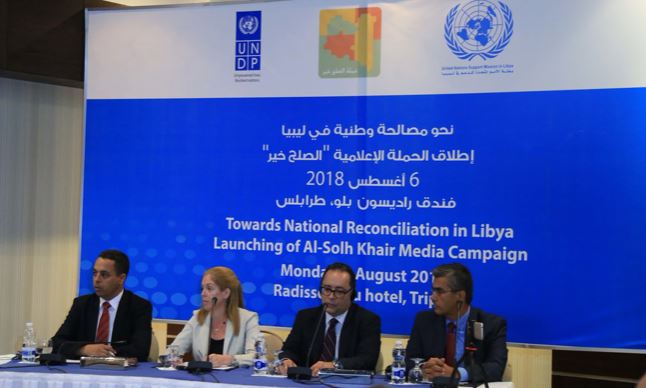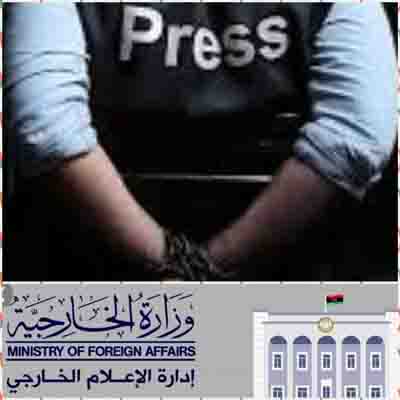By Sami Zaptia.

London, 8 August 2018:
As part of its efforts to strengthen the participation of all Libyans in the process of reconciliation, the United Nations Support Mission in Libya (UNSMIL) and the United Nations Development Program (UNDP) launched the “Al-Solh Khair” (“Reconciliation is Good”) media campaign on Monday.
The UN said that this nationwide initiative aims to raise awareness among citizens about the importance played by dialogue, local reconciliation agreements and social cohesion in achieving peace in the country.
Deputy Special Representative of the UN Secretary General for Political Affairs, Stephanie T. Williams; and UNDP Country Director, Mr. Sultan Hajiyev, inaugurated the event, in the presence of several representatives from the Libyan Government of National Accord, the High Council of State and the IDP Committee.
“Arriving at a collective memory of the past is one of the greatest challenges facing a post-conflict society, because it implies reaching a degree of consensus in a deeply polarized context,” said Williams during the ceremony. “If a truth and reconciliation commission is ever to be institutionalized in Libya, it will face important challenges as attempts to present an objective account of a society’s violent past will inevitably have to contend with multiple perspectives and interpretations of this history.”
On his part, Mr. Hajiyev said in his remarks: “UNDP’s role is not only helping the authorities to build resilience and stability for their citizens, but at the same time to support them in bringing together all parties for a real reconciliation process. It takes a lot of courage to come with a message of peace in the middle of the current circumstances. It is time for the courage of peace, and I believe Libyan people are very brave. “
During the coming months, television and radio stations around Libya will broadcast messages of peace, interviews and talk-shows to advance Libyans engagement in reconciliation processes and enhance a culture of tolerance, respect for human rights, cultural diversity, solidarity and the rejection of violence.
It will be recalled that UNSMIL had retained the Geneva-based Centre for Humanitarian Dialogue (HD) to organize the Libyan National Conference process which UNSMIL hopes will conclude in one final national conference that would reflect the desires of the general Libyan public – as opposed to the political and militia elites.
The plan is part of UNSMIL head Ghassan Salame’s Action Plan approved by the UN General Assembly in September and by the UN Security Council in October 2017.
At the Security Council meeting, Council members had stressed that the Libyan Political Agreement (LPA) signed in Skhirat, Morocco in December 2015 remained the only viable framework to end the country’s political crisis. They had said that they considered that making the agreement work was the key to holding elections and completing Libya’s political transition.
The consultative phase of the Libyan National Conference came to an end on 11 July, the Geneva-
The consultative phase of the Libyan National Conference process had started on 4 April and had ended on 11 July this year. It had reported its initial findings in May 2018. The findings had reported that Libyans wanted:
- A united Libya capable of defending its borders and sovereignty
- A united military institution, free from political interference and committed to the national interest
- More fair distribution of resources through a decentralized state
- A government based on competence, not identity
- Professional police services to ensure local security
Presenting his latest report on the situation in Libya to the UN Security Council, Salame said of the National Conference ‘‘We have concluded the consultative phase of the National Conference Process. Over the last 14 weeks, we have held, thanks to our dedicated partner, the Centre for Humanitarian Dialogue, more than seventy-five meetings in Libya and abroad.
Over 7,000 Libyans participated, a quarter of whom were women. 2,000 submissions were received online. 130,000 followers have joined the consultative process on social media, generating half a million comments. Digital messaging reached over 1.800.000 persons. Furthermore, the proceedings have been covered in great detail on Libyan media.
This bottom-up process’’, he added ‘‘is an integral part of the Action Plan. It puts the Libyan people at the heart of the political process, whoever or wherever they may be. For many communities, this was the first time they had been actively engaged in the political process and consulted on the future of their nation. Specific events were held for women, internally displaced persons and youth, while others targeted far-flung communities in the South, abroad, and constituencies previously excluded.
The National Conference local consultations have provided a tremendous insight into the hopes, fears and visions of the Libyan people for a way forwards. The next phase of the National Conference is the distillation of the thousands of pages of reports into a full and final report with national conclusions and recommendations, to support the next steps out of transition.
The date and the venue of the final event will be determined soon’’, he concluded on the topic.
https://www.libyaherald.com/2018/07/17/consultative-phase-of-the-libyan-national-conference-comes-to-an-end/
https://www.libyaherald.com/2018/05/17/libyan-national-conference-process-first-phase-preparations-concluded-interim-results-announced/









